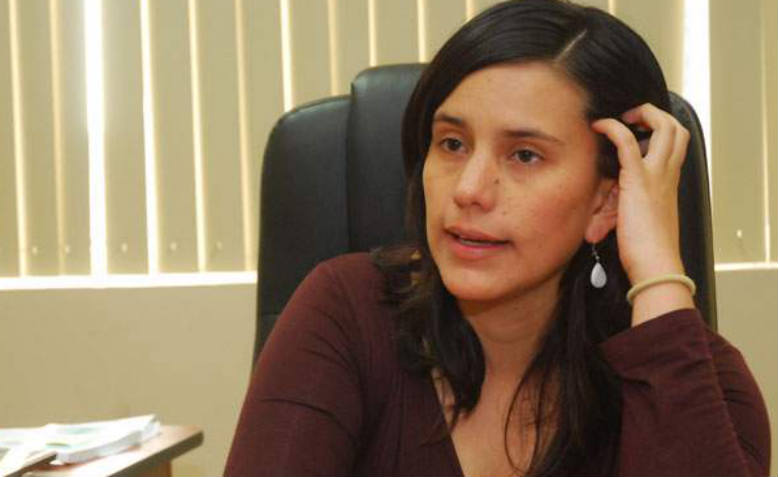 Veronika Mendoza. Photo: Wikipedia Commons.
Veronika Mendoza. Photo: Wikipedia Commons.
By becoming entrenched in parliamentary politics, the left coalition under Vero Mendoza has undermined its support base
Over six months after Peru’s presidential election, the country remains in a state of political instability. Narrowly elected president and veteran of the neo-liberal establishment, Pedro Pablo Kuczynski (PPK), looks increasingly weak and incompetent in the face of challenges from an unsympathetic congress.
Peru’s congress is dominated by representatives of the ultra-conservative Fuerza Popular, its leader; Keiko Fujimori looked destined for the presidency until a late PPK resurgence won the day. Fujimori’s popularity has grown since the election, further increasing the pressure on PPK. On the face of it, this seems like a story between two regressive strands of neo-liberalism and conservatism; but, in fact, it is the woeful response from Peru’s left that carries the most significance globally.
Merely days before the election, it appeared a certainty that Keiko Fujimori would be following in the footsteps of her disgraced father. Much like Alberto, Keiko’s support lay in smaller towns and rural areas spread across the country, gaining popularity with people disaffected by corruption in Lima.
Meanwhile, PPK’s support was naturally concentrated within larger cities like Lima. Despite strong support in the capital, his overall support was deemed to be far lower than that of Keiko and, indeed, some forecasters were even predicting that he would not even make it to the final ballot at the expense of leftist Vero Mendoza.
Mendoza, a qualified psychologist, appeared to face an unenviable task upon being named the 2016 presidential candidate for the Leftist coalition, Frente Amplio. Her mission was to unite a deeply divided Peruvian left as well as heal the country’s mistrust of socialism, a hangover from disingenuous leftist leaders gone-by and the bloodshed that engulfed the early 1980’s.
Against all odds, Mendoza was able to achieve much of this and went into the elections with high hopes of reaching the final round of voting. Tapping into much of the country’s anti-establishment sentiment, she was able to build a strong core of support within Peru’s poor and rural areas.
It was not to be. PPK was able to rally enough support, beating Mendoza by less than 3% of the vote. In overly simplistic terms, this was the end of Mendoza’s run for the presidency; but in truth, it should have been the start of something far greater.
Mendoza admitted defeat in the presidential race and for several days appeared to disappear from face of the earth, only to eventually reappear imploring her supporters to back PPK. This was a major mistake. While it succeeded in keeping Keiko out of office, it completely undermined Mendoza’s claim as the genuine opposition to the Peruvian establishment.
While she was undoubtedly correct to oppose Fujimori’s regressive and authoritarian programme, by putting down her sword and shuffling behind PPK, Mendoza made a foolish error. Much like Bernie Sanders in America, paralysed by the pressure to unite in opposition against a vile candidate, she killed any hope of a genuine movement around her dead in its tracks.
If Mendoza had instead continued to ardently oppose Fujimori (and indeed PPK) on her own terms, she would have been left with credibility and a genuine movement behind her regardless of the election result.
If we fast-forward to the current situation, the effects of Mendoza’s decision are clear to see. Despite a wounded PPK, a squabbling congress and yet more corruption, she is in no position to seize upon the moment.
A clear similarity can be drawn here between Mendoza and Sanders. Since losing the Democratic nomination, Sanders quickly retreated, imploring his supporters back Hillary Clinton. Months later, despite recently joining protests against Trump’s ban on Muslims, much of the movement around Sanders has dissolved, leaving him unable to provide the overwhelming opposition needed.
Despite her decision, Mendoza could still launch a vicious campaign against both PPK and Keiko, restating her opposition to the conservative establishment. Yet, this seems increasingly unlikely. In fact, in recent months, she has made moves to further support PPK, defending him from increasing attacks from congress. There have even been strong rumours that both PPK and Mendoza may form a pact in any impending congress elections to neuter the threat of Keiko Fujimori and her party.
While such pact may strengthen PPK’s grip on the presidency, it would only act to further undermine Mendoza, leaving her implicated in attacks on PPK and accusations of trying to subvert democracy.
In moving closer to PPK, Mendoza is increasingly acting to undermine her support base, many of whom are hostile to the president, a symbol of the neo-liberal establishment that has done so little for so many Peruvians. As Mendoza’s supporters look for an answer to the rampant tide of conservatism, she won’t find it lodged in PPK’s back pocket.
Instead of engaging in the arguments that underpin Keiko’s support, VeroMendoza has fallen into the familiar trap of becoming entrenched in parliamentary politics, oblivious to the sentiment on the ground. Rather than building a strong movement bravely opposing two brutal forms of right-wing ideology, Mendoza finds herself stuck supporting the more palatable arm of oppression.

